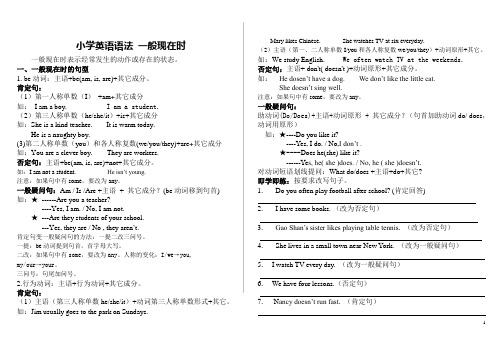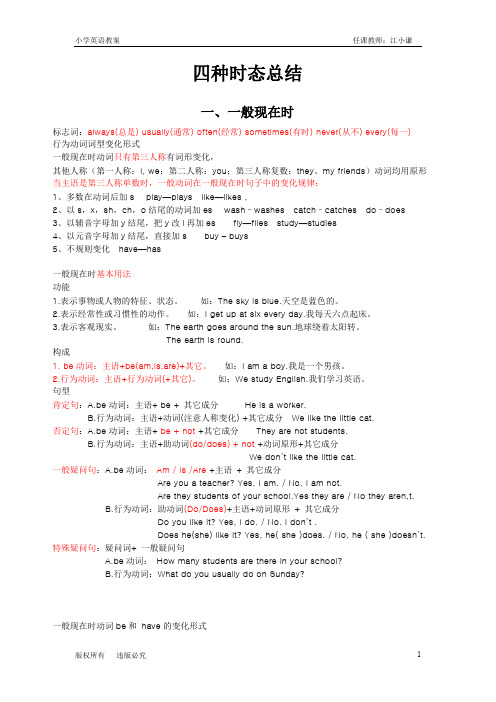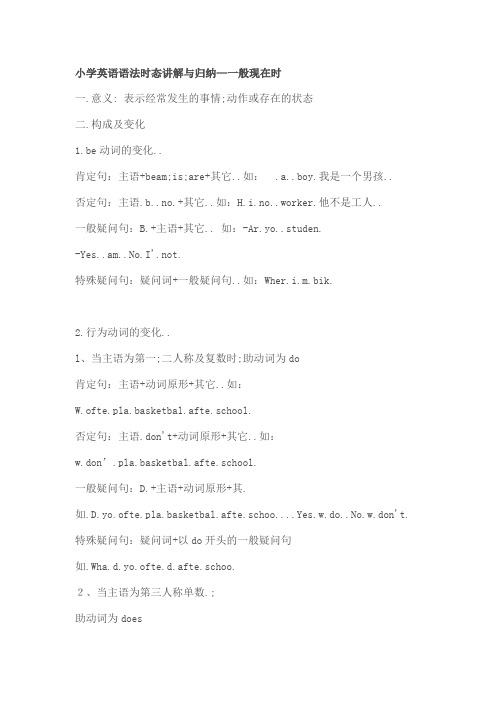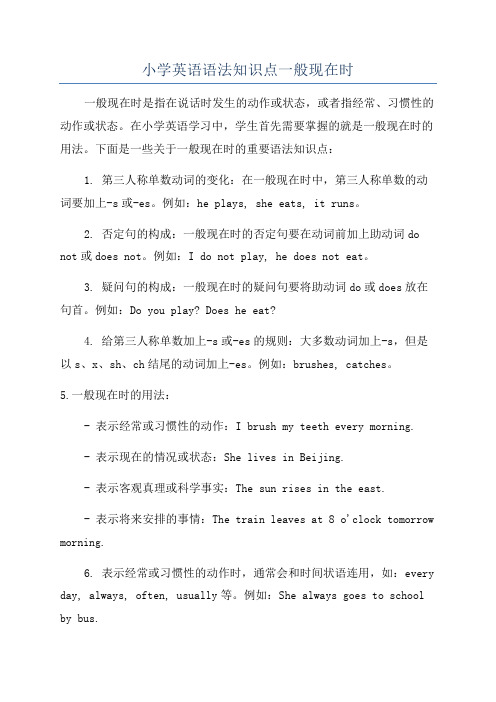小学英语一般现在时
小学英语语法_一般现在时

小学英语语法一般现在时一般现在时表示经常发生的动作或存在的状态。
一、一般现在时的句型1. be动词:主语+be(am, is, are)+其它成分。
肯定句:(1)第一人称单数(I)+am+其它成分如:I am a boy. I am a student.(2)第三人称单数(he/she/it)+is+其它成分如:She is a kind teacher. It is warm today.He is a naughty boy.(3)第二人称单数(you)和各人称复数(we/you/they)+are+其它成分如:You are a clever boy. They are workers.否定句:主语+be(am, is, are)+not+其它成分。
如:I am not a student. He isn’t young.注意:如果句中有some,要改为any。
一般疑问句:Am / Is /Are +主语+ 其它成分?(be动词移到句首) 如:★------Are you a teacher?----Yes, I am. / No, I am not.★---Are they students of your school.---Yes, they are / No , they aren’t.肯定句变一般疑问句的方法:一提二改三问号。
一提:be动词提到句首,首字母大写。
二改:如果句中有some,要改为any。
人称的变化:I/we→you,my/our→your。
三问号:句尾加问号。
2.行为动词:主语+行为动词+其它成分。
肯定句:(1)主语(第三人称单数he/she/it)+动词第三人称单数形式+其它。
如:Jim usually goes to the park on Sundays.Mary likes Chinese. She watches TV at six everyday.(2)主语(第一、二人称单数I/you和各人称复数we/you/they)+动词原形+其它。
(完整版)小学英语时态总结

四种时态总结一、一般现在时标志词:always(总是) usually(通常) often(经常) sometimes(有时) never(从不) every(每一)行为动词词型变化形式一般现在时动词只有第三人称有词形变化,其他人称(第一人称:I, we;第二人称:you;第三人称复数:they、my friends)动词均用原形当主语是第三人称单数时,一般动词在一般现在时句子中的变化规律:1、多数在动词后加s play—plays like—likes ,2、以s,x,sh,ch,o结尾的动词加es wash–washes catch–catches do–does3、以辅音字母加y结尾,把y改i再加es fly—flies study—studies4、以元音字母加y结尾,直接加s buy – buys5、不规则变化have—has一般现在时基本用法功能1.表示事物或人物的特征、状态。
如:The sky is blue.天空是蓝色的。
2.表示经常性或习惯性的动作。
如:I get up at six every day.我每天六点起床。
3.表示客观现实。
如:The earth goes around the sun.地球绕着太阳转。
The earth is round.构成1. be动词:主语+be(am,is,are)+其它。
如:I am a boy.我是一个男孩。
2.行为动词:主语+行为动词(+其它)。
如:We study English.我们学习英语。
句型肯定句:A.be动词:主语+ be + 其它成分He is a worker.B.行为动词:主语+动词(注意人称变化) +其它成分We like the little cat.否定句:A.be动词:主语+ be + not +其它成分They are not students.B.行为动词:主语+助动词(do/does) + not +动词原形+其它成分We don’t like the little cat.一般疑问句:A.be动词:Am / Is /Are +主语+ 其它成分Are you a teacher? Yes, I am. / No, I am not.Are they students of your school.Yes they are / No they aren,t.B.行为动词:助动词(Do/Does)+主语+动词原形+ 其它成分Do you like it? Yes, I do. / No. I don’t . Does he(she) like it? Yes, he( she )does. / No, he ( she )doesn’t.特殊疑问句:疑问词+ 一般疑问句A.be动词:How many students are there in your school?B.行为动词:What do you usually do on Sunday?一般现在时动词be和have的变化形式1.动词Be 叫连系动词, 用法:第一人称单数用am,第三人称单数用is,其它人称用are。
小学英语语法一般现在时总结

千里之行,始于足下。
学校英语语法一般现在时总结学校英语语法一般现在时总结一般现在时是英语中最基础和最常用的时态之一,它用来表达经常性的、重复性的或普遍性的动作或状态。
在学校英语学习中,同学们需要把握一般现在时的用法和构造。
一般现在时的构造:一般现在时的确定句的构造为:主语 + 动词原形(第三人称单数要加-s 或-es)+其他。
例句:I play football every day.He plays football every day.She watches TV on weekends.一般现在时的否定句的构造为:主语 + do not / does not + 动词原形 +其他。
例句:I do not play football every day.He does not play football every day.She does not watch TV on weekends.一般现在时的疑问句的构造为:Do / Does + 主语 + 动词原形 +其他?例句:Do you play football every day?Does he play football every day?Does she watch TV on weekends?一般现在时的用法:1. 表示经常性的动作或习惯。
第1页/共3页锲而不舍,金石可镂。
例句:I brush my teeth before going to bed.She always eats an apple in the morning.They usually walk to school.2. 表示普遍性的事实或真理。
例句:Water boils at 100 degrees Celsius.The sun rises in the east.Dogs are loyal animals.3. 表示现阶段的状态。
例句:I am a student.She is a teacher.They are happy.4. 描述行程支配或固定时间的动作。
小学英语语法时态讲解与归纳一般现在时

小学英语语法时态讲解与归纳—一般现在时一.意义: 表示经常发生的事情;动作或存在的状态二.构成及变化1.be动词的变化..肯定句:主语+beam;is;are+其它..如:.a..boy.我是一个男孩..否定句:主语.b..no.+其它..如:H.i.no..worker.他不是工人..一般疑问句:B.+主语+其它.. 如:-Ar.yo..studen.-Yes..am..No.I'.not.特殊疑问句:疑问词+一般疑问句..如:Wher.i.m.bik.2.行为动词的变化..l、当主语为第一;二人称及复数时;助动词为do肯定句:主语+动词原形+其它..如:W.ofte.pla.basketbal.afte.school.否定句:主语.don't+动词原形+其它..如:w.don’.pla.basketbal.afte.school.一般疑问句:D.+主语+动词原形+其.如.D.yo.ofte.pla.basketbal.afte.schoo....Yes.w.do..No.w.don't. 特殊疑问句:疑问词+以do开头的一般疑问句如.Wha.d.yo.ofte.d.afte.schoo.2、当主语为第三人称单数.;助动词为does肯定句:主语+动词三单式+其它..如.H.swim.well.否定句:主语.doesn’t+动词原形+其它..如:H.doesn’.swi.well..一般疑问句:Doe.+主语+动词原形+其它..如:Doe.h.swi.wel.Yes.h.does..No.h.doesn't.特殊疑问句:疑问词+以does开头的一般疑问句如.Ho.doe.you.fathe.g.t.wor.三.第三人称单数的动词变化规则只有在第三人称为主语的肯定句中;动词才用三单式1多数动词直接加s:runs gets likes collets takes playsclimbs…….2结尾是s.x.sh.ch.o;前为辅音字母;结尾加e.: watches teaches goes does washes crosses mixes brushes3动词末尾y前为辅音:将y改为i加es.study→studie.fly→flies carry→carriescry→cries但在y前如果为元音则直接加s: buys says四.时间标志:uall..ofte..sometime.;every…一般现在时练习题1I.用下列单词的适当形式填空1.We often___________play in the playground.2.He _________get up at six o’clock.3.__________you _________brush your teeth every morning4.What________________do he usually________________do after school5.Danny ________________study English; Chinese; maths; science and Art at school.6.Mike sometimes __________go to the park with his sister.7.At eight at night; she __________watch TV with his parents.8.________ Mike________read English every day9.How many lessons_________your classmates________have on Monday10.What time_________his mother_________do the houseworkII.改句子1.Do you often play football after school 改为肯定句2.I have many books.改为否定句3.Gao S han’s sister likes playing table tennis 改为否定句4.She lives in a small town near New York.改为一般疑问句5.I watch TV every day.改为一般疑问句6.We have four lessons.改为否定句7.Nancy doesn’t run fast 改为肯定句8.M.do.run.fast.................................否定句: 一般疑问句:9.Mike has two letters for him.一般疑问句:否定句: 10.I usually play football on Friday afternoon.否定句:一般疑问句:划线提问11.Su Yang usually washes some clothes on Saturday.否定句:一般疑问句:划线提问:12.Mingming usually waters the flowers every day.否定句:一般疑问句:13.Tom does his homework at home.否定句:一般疑问句:一般现在时练习题2一、用所给动词的真确形式填空1.. lik.___________.swim.2.H._________rea.Englis. ever. day.3.W._________got.schoo.a.seve.i.th.morning.4.Mike________got.schoo.a.seve.i.th.morning.5.M. mother________lik.______g.shopping.6..ca.________dra. man. beautifu. pictures.7.She_________mak.. mode. plane.8.D. yo.________like_________ru.9.Doe. he_________like_________jum.10.Doe.Nancy_________growflower.o.Saturda.11.Th. teachers________like___________dance.12.Th.teacher________like____________dance.13.Th.students___________spea.Englis.i.class.14.Th.student_________spea.Chines.afte.class.15.Let’s____________an.pla.footbal.. g.16.He____________.lik.swimmin.. no.17.I’.sorr.____________tha.. hea.18.Wan.Bin.is___________. writ. a.E-mai.t.hi.frien..19.H.has_____________.headach.. ge.20._________yo.stud.Englis.a.schoo..Ye..I___________. d.21.__________you.siste.stud.Englis.a.schoo..N..she_________.. d.22.I’.________.bette.. fee.23.Why__________To.absen.toda.. b.二、用所给的人称改写句子1..tak.photo.o.Sunday. Mike2.W.gro.beautifu.flowers.she3.The.lik.collectin.stamps.Ben4..liste.t.musi.carefully.m.aunt5.Yo.lik.makin..mode.ship.Helen6.W.clea.th.classroo.ever.day.he7.The.loo.afte.th.pandas.M.Wang8..dra..tre.an.som.flowers.Nancy9.W.g.t.be.a.eight. m.sister10..rea.newspaper.i.th.evening.M.Green。
小学英语语法-一般现在时详细讲解

小学英语语法-一般现在时详细讲解一般现在时是英语语法中最基础也是最常用的时态之一。
它表示的是习惯性、经常性和普遍性的行为或状态。
在本文中,我将详细介绍一般现在时的形式、用法和注意事项。
一、一般现在时的形式一般现在时的肯定句的基本结构是:主语+谓语动词+其他。
谓语动词在第三人称单数形式时要加上-s或-es。
例如:- I eat breakfast every morning.(我每天早上吃早饭。
)- She goes to school by bus.(她坐公共汽车去学校。
)否定句的结构是:主语+do not/does not+动词原形+其他。
例如:- I do not like coffee.(我不喜欢咖啡。
)- He does not play football.(他不踢足球。
)疑问句的结构是:Do/Does+主语+动词原形+其他?例如:- Do you like ice cream?(你喜欢冰淇淋吗?)- Does she go to the park every weekend?(她每个周末去公园吗?)二、一般现在时的用法第1页/共4页1. 表示习惯或经常性的动作:- I write in my diary every night.(我每天晚上写日记。
)- They play basketball every Sunday.(他们每个星期天打篮球。
)2. 表示客观事实、自然规律或科学真理:- Water boils at 100 degrees Celsius.(水在100摄氏度时煮沸。
)- The sun rises in the east.(太阳从东方升起。
)3. 表示感觉、想法和喜好:- I love chocolate.(我喜欢巧克力。
)- He hates to wake up early.(他讨厌早起。
)4. 表示现时状态或现时临时的动作:- I am a student.(我是一个学生。
小学英语语法知识点一般现在时

小学英语语法知识点一般现在时一般现在时是指在说话时发生的动作或状态,或者指经常、习惯性的动作或状态。
在小学英语学习中,学生首先需要掌握的就是一般现在时的用法。
下面是一些关于一般现在时的重要语法知识点:1. 第三人称单数动词的变化:在一般现在时中,第三人称单数的动词要加上-s或-es。
例如:he plays, she eats, it runs。
2. 否定句的构成:一般现在时的否定句要在动词前加上助动词do not或does not。
例如:I do not play, he does not eat。
3. 疑问句的构成:一般现在时的疑问句要将助动词do或does放在句首。
例如:Do you play? Does he eat?4. 给第三人称单数加上-s或-es的规则:大多数动词加上-s,但是以s、x、sh、ch结尾的动词加上-es。
例如:brushes, catches。
5.一般现在时的用法:- 表示经常或习惯性的动作:I brush my teeth every morning.- 表示现在的情况或状态:She lives in Beijing.- 表示客观真理或科学事实:The sun rises in the east.- 表示将来安排的事情:The train leaves at 8 o'clock tomorrow morning.6. 表示经常或习惯性的动作时,通常会和时间状语连用,如:every day, always, often, usually等。
例如:She always goes to school by bus.7. 表示现在的情况或状态时,通常与be动词连用,如:am, is, are。
例如:I am a student.8. 表示客观真理或科学事实时,通常不和时间状语连用。
例如:Water boils at 100 degrees Celsius.9.一般现在时中的一些特殊用法:- 示意要求或建议的动词(如:want, need, like, love, hate等)后接不定式,用法类似于祈使句。
小学英语语法时态一般现在时
小学英语语法时态一般现在时一般现在时(Simple Present Tense)是英语语法中最基本的一种时态,表示目前正发生的动作、存在的状态或经常性的动作。
以下是关于一般现在时的相关用法和规则。
一、动词的变化:一般现在时中,动词的第三人称单数形式(he、she、it等)需加上-s或-es。
例如:- I play football.(我踢足球。
)- She cooks dinner.(她做晚饭。
)- He watches TV.(他看电视。
)但是,以下情况除外:1. 当动词以某些字母结尾时,在动词后面直接加上-s,而不再加-es。
这些字母包括:-o(goes)、-ss(passes)、-x(fixes)、-ch(watches)、-sh(rushes)等。
例如:- She goes to school.(她去上学。
)- He passes the exam.(他通过了考试。
)2. 当动词以辅音字母+y结尾时,要将y改为i,再加-es。
例如:- He studies English.(他学习英语。
)- She tries her best.(她尽力。
)第1页/共4页3. 当动词以-e结尾时,只需加上-s。
例如:- They write letters.(他们写信。
)- He can dance.(他会跳舞。
)二、用法:1. 描述客观事实或经常性动作:一般现在时常用于描述客观事实或经常性动作。
例如:- Water boils at 100 degrees Celsius.(水沸腾的温度是100摄氏度。
)- I usually go to bed at 10 o'clock.(我通常在10点钟上床睡觉。
)2. 描述现阶段的状态:一般现在时还可用来描述现阶段的状态或对现实情况的评论。
例如:- They live in New York.(他们住在纽约。
)- She looks tired.(她看起来很累。
小学阶段的一般现在时
Part Three 一般现在时与其他时态
的区别
与一般过去时的区别
定义:一般现在时表示现在发生的动作或状态,一般过去时表示过去发生的动作或状态
时间状语:一般现在时的时间状语包括now、today、this week等,而一般过去时的时间 状语包括yesterday、last week、ago等
动词形式:一般现在时的动词形式为原形,一般过去时的动词形式为过去式
否定句句型结构
谓语动词前加 助动词do not
(don't)
谓语动词前加 系动词be的一 般现在时形式
谓语动词前加 助动词have not (haven't)
谓语动词前加 助动词助动词 have (has)
一般疑问句句型结构
谓语动词提前:Do you want to go to the park? 助动词提前:Is she a student? 情态动词提前:Can you help me? 疑问词提前:What time does he get up?
用法:表示将来的动作或状态,强调客观事实或普遍真理。
例子:I don't know when he will come back, but if he does, I will let you know.
注意事项:在宾语从句中,一般现在时不能与具体的时间状语连用,如next year、 tomorrow等。
小学阶段的一般 现在时
/单击此处添加副标题内容/
汇报人:XX
目 录
Part One.
一般现在时的基 本概念
Part Two.
小学阶段的一般 现在时用法
Part Three.
一般现在时与其 他时态的区别
小学英语语法一般现在时(包括练习)
小学英语语法一般现在时(包括练习)一般现在时是英语中最常用的时态之一,用于表示经常性的动作、惯性的行为、客观事实以及现阶段的情况等。
在使用一般现在时时,需要注意动词的变化规则。
动词的变化规则一般现在时的动词变化规则如下:1. 对于大部分动词,其第三人称单数形式在动词末尾加上-s。
例如:go → goes,eat → eats。
2. 对于以辅音字母+y结尾的动词,将y变为i,再加上-es。
例如:study → studies,fly → flies。
3. 如果动词以-s, -sh, -ch, -x或-z结尾,直接加上-es。
例如:watch → watches,fix → fixes。
4. 对于其他动词,直接在动词末尾加上-s。
例如:play → plays,read → reads。
练题请根据句子的语境,用适当的动词形式填空。
每个空格只填一个单词。
1. Peter ___________ (like) to play basketball with his friends every weekend.2. My mother ___________ (work) as a nurse in the hospital.3. The cat ___________ (sleep) on the sofa most of the day.4. We ___________ (watch) movies at the cinema every Friday night.5. Sarah ___________ (brush) her teeth twice a day.参考答案1. Peter likes to play basketball with his friends every weekend.2. My mother works as a nurse in the hospital.3. The cat sleeps on the sofa most of the day.4. We watch movies at the cinema every Friday night.5. Sarah brushes her teeth twice a day.以上是关于小学英语语法一般现在时以及练习题的内容。
小学英语基础时态4种
小学英语基础时态4种一、一般现在时一般现在时基本用法介绍【No. 1】一般现在时的功能1.表示事物或人物的特征、状态。
如:The sky is blue.天空是蓝色的。
2.表示经常性或习惯性的动作。
如:I get up at six every day.我每天六点起床。
3.表示客观现实。
如:The earth goes around the sun.地球绕着太阳转。
一般现在时的构成1. be动词:主语+be(am,is,are)+其它。
如:I am a boy.我是一个男孩。
2.行为动词:主语+行为动词(+其它)。
如:We study English.我们学习英语。
当主语为第三人称单数(he, she,it)时,要在动词后加"-s"或"-es"。
如:Mary likes Chinese.玛丽喜欢汉语。
一般现在时的变化1. be动词的变化。
否定句:主语+ be + not +其它。
如:He is not a worker.他不是工人。
一般疑问句:Be +主语+其它。
如:-Are you a student?-Yes. I am. / No, I'm not.特殊疑问句:疑问词+一般疑问句。
如:Where is my bike?2.行为动词的变化。
否定句:主语+ don't( doesn't ) +动词原形(+其它)。
如:I don't like bread.当主语为第三人称单数时,要用doesn't构成否定句。
如:He doesn't often play.一般疑问句:Do( Does ) +主语+动词原形+其它。
如:- Do you often play football?- Yes, I do. / No, I don't.当主语为第三人称单数时,要用does构成一般疑问句。
如:- Does she go to work by bike?- Yes, she does. / No, she doesn't.特殊疑问句:疑问词+一般疑问句。
- 1、下载文档前请自行甄别文档内容的完整性,平台不提供额外的编辑、内容补充、找答案等附加服务。
- 2、"仅部分预览"的文档,不可在线预览部分如存在完整性等问题,可反馈申请退款(可完整预览的文档不适用该条件!)。
- 3、如文档侵犯您的权益,请联系客服反馈,我们会尽快为您处理(人工客服工作时间:9:00-18:30)。
write---writing, make---making, dance--dancing, take--- taking…
以重读闭音节结尾,双写结尾字母再加ing.
sit---sitting, swim---swimming, put---putting,
run---running, forget---forgetting,
为什么TF boys 在舞台上一直唱歌?
-----Because they are practicing their new songs. 因为他们正在练习他们的新歌。
补充知识
• 动词 ing 形式
动词原型直接加ing.
read---reading, drink---drinking, eat--- eating, meet---meeting….
人称单数
This cake tastes very good. d. 不定代词someone, somebody, nobody作主语为第三人称单
数。
Nobody can make everything prefect. e. 不可数名词作主语看作第三人称单数。
Milk is in the glass. f. 数字当主语时可看作第三人称单数。
Welcome to new term
-----by Li Jialing
(274844986@)
Contents Of This Lesson
• Part 1 Review phonetic symbol ( 音标复习) -----Pronunciation(读音) -----Practice(练习)
(C)
a. happy b. candy c. windy d. by /'hæpɪ/ /'kændɪ/ /'wɪndɪ / /baɪ /
a. shy /ʃaɪ/
b. sorry
/'sɒrɪ/
c. baby
/'beɪbɪ/
(d)
d. sunny
/ 'sʌnɪ /
(a)
/ bə'nɑːnə /
读音标识单词
a. do b. dose c. is d. are
2. Most of the students (
) China.
a. comes from b. is from c. are from d. come of
3.----(
) she kind?
---- Yes, she (
).
a. Dose; dose b. Is; isn’t
• 2. 副词短语 once a week, every day, every month, on Sunday …..
• 3. 具体时间 at 6 o’clock every morning • e.g. I often clean my room and wash my
clothes. Sometimes I swim with Miss Li .
do/情态动词can + 主语 + v原型+ sth. • e.g. • What can I do for you? • Where does Huang Xiaoming swim every morning.
Practice
• 英汉互译
1. Wang Yuan is a cute boy.
王源是个可爱的男孩
6 is my lucky number.
一般现在时句型规则
肯(否)定句
sb + be动词(not)/don’t /doesn’t +v.原型+ sth. e.g. I often go shopping with my sister.
Wang Junkai always drinks milk for his breakfast.
e.g. a.-----What is Angela doing in her room? 安琪拉一直在房间做
什么?
----- She is doing her homework in her room.
她一直在房间写作业
b.-----Why are TF boys singing songs on the stage?
get---getting….
Part 2 Review Simple Present Tense
(复习一般现在时)
-----summarize rules(总结规律) -----learn sentences, make sentences
(学习句子,造句)
Part 3 Learn Present Continuous Tense(现在进行时)
Read and choose
• Po ( )Baozi everyday and he can ( )kung fu from kung fu master.
• a. eat
b. eats
• a. study
b. studies
一般现在时专项练习题
1.Where (
) Lucy come from?
一般现在时的重难点
主语为第三人称单数的情况: a.人称代词he, she, it 是第三人称单数。
Peter listens to the radio at 7 am. b.单个人名或地名或称呼为第三人称单数
That / This book is yours. c. 单数可数名词this / that / the/ a 后加上可数名词单数为第三
一般疑问句
be动词+ sb + sth. e.g. Are you 11 years old? 助动词do/情态动词can + sb + v原型+ sth. e.g. Does Tom eat rice everyday?
Can Lu Han sing songs? 注意:句子当中若使用了do或者can,那么句子当中的动词用原
---- Yes, he is./ No, he isn’t. b.----Are they swimming in the school sports
center?
他们正在学校运动中心游泳吗?
---- Yes, they are./ No, they aren’t.
现在进行时的特殊疑问句
• 特殊疑问词(what, where, why….)+be动词+主语+ving+sth.
/ 'æp(ə)l /
/ piːtʃ /
/ klɑːs /
/ 'eksəsaɪz /
/ 'dɑːnsɪŋ /
/ ni:d /
/ dɪ'spɪkəbl /
课外单词扩充
• frozen ['frozn] • ant [æ nt] • bat [bæ t] • dragon ['dræɡən ]
Part 2
型,不受主语为三单的影响
特殊疑问句
• 特殊疑问词(how often/ who/ what/where….)+ be动词+ 主语+其他.
• e.g. • How old are you? • Who are you? • What is Huang Zitao like? • Why is your mum so angry? • 特殊疑问词(how often/ who/ what/where….)+助动词
Part 1
• Review phonetic symbol ( 音标复习)
Pronunciation(读音)
Pronunciation of 26 letters
Practice
1.Read and choose(读单词,选出每组中画线部分发音不同的一项) a. player b. party c. yes d. many /'pleɪə/ /pɑːtɪ / /jes / /'menɪ /
Review Simple Present Tense
(复习一般现在时)
什么是一般现在时: 表示经常或习惯性的动作,表示现在的状态或主 语具备的性格和能力。
Q1:习惯性的动作
Q2: 现在的状态
Q3: 主语具备的性格和能力
一般现在时的标志词
• 1. 频度副词 always, often, usually, sometimes, seldom, hardly, never…..
2. 王源在学校是个很努力学习的学生。 Wang Yuan is hard-working student in school.
3. 王源通常在早上8点起床,并且他通常在周末写作业。 Wang Yuan often gets up in 8 o’clock and he usually does his homework on weekend.
(注意:be动词形式随着主语而变化,现在进行时 当中be动词只有am, is, are三种形式)
现在进行时基本句型
• 1. 肯定句/否定句构成。 主语+be动词(not)+v-ing+sth.
表正在进行的事情:
He is doing homework. I am teaching English. They are playing computer games. Lily isn’t cleaning her room. These dogs are running.
表现阶段正在进行的事
I am writing an English novel.我正在撰写一部英文小说。 They are studying in Dong Feng primary school.
